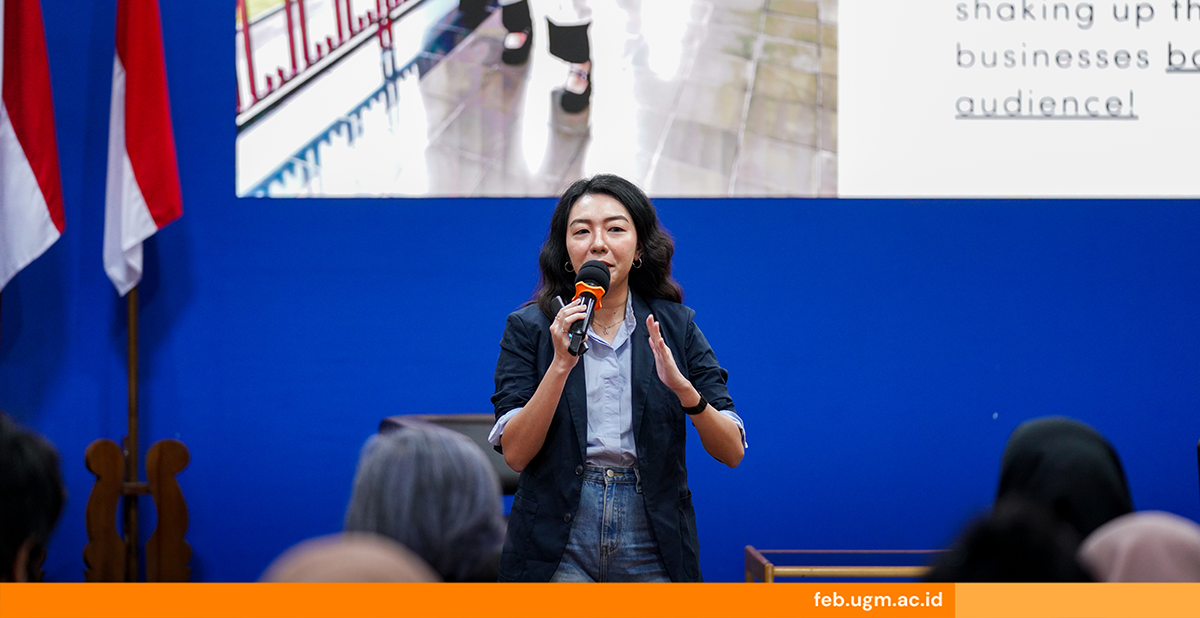
In the rapidly evolving digital age, educational institutions must adapt to stay relevant in the dynamic flow of information. Digital marketing strategies have become critical tools for building a strong reputation and presence.
The Faculty of Economics and Business, Universitas Gadjah Mada (FEB UGM), highlighted this at a workshop titled “Optimizing Digital Marketing and Campus Social Media” on Friday (3/21/2025). In this event, Winda Mirza Pratiwi, a strategic communications consultant and digital marketing expert, shared insights on digital marketing for the education industry.
Winda revealed that the secret behind viral content, best-selling products, and fast-moving social movements lies in combining three media types that serve as the foundation for building a successful digital marketing strategy. Based on the concept developed by Jonah Berger in his book Contagious, these three key elements are owned media, earned media, and paid media.
Owned media refers to personally or institutionally controlled platforms such as websites, blogs, and social media accounts. Earned media consists of unpaid publicity, such as student and alums testimonials or media coverage of the institution. Meanwhile, paid media involves paid advertising to expand reach through promotions, advertising, or influencer collaborations.
“By strategically combining these three elements, institutions can have a greater impact in building and enhancing their digital presence,” Winda explained.
Media presence is fundamental to digital marketing strategy and cannot be overlooked. Winda emphasized that even as technologies like artificial intelligence (AI) continue to advance, public relations (PR) remains essential because it delivers messages with emotional and empathetic approaches that technology cannot replicate.
In addition, media mapping plays a vital role in digital communications. One approach that can be used is impact mapping, which involves defining objectives, key players, desired impact, and expected outcomes.
“Using media without clear objectives and mapping is a big mistake. Every strategy must have a measurable end goal to ensure optimal results,” said Winda.
Beyond media, stakeholder mapping is also critical in digital marketing strategies. Defining roles helps streamline communication and coordination. With proper mapping, teams can quickly identify their responsibilities, preventing miscommunication and redundant tasks.
“Without well-defined persona mapping, it will be difficult to implement digital marketing effectively,” she added.
Winda emphasized that engagement is not just about numbers, such as likes or comments, but also the quality of interactions with audiences. One key approach is content personalization, using data analysis from Google Analytics to understand audience preferences and create more relevant content. Social media optimization must be tailored to the audience.
“LinkedIn is great for reaching professionals and alumni, TikTok and Instagram for prospective students, while Facebook is more appropriate for parents and academic communities,” she explained.
To meet the challenges of the digital age, institutions must also develop crisis management strategies to address negative issues that could damage their reputation. Therefore, continuous content monitoring and evaluation using analytics tools is essential to measure the effectiveness of marketing strategies. This allows institutions to adjust their approach based on data-driven insights. In addition, benchmarking against leading institutions is an essential step in developing a strong digital marketing strategy.
Winda concluded her presentation by highlighting five key principles for effective digital marketing. Five key principles: holistic integration by synergizing different types of media; quality content creation that is engaging, relevant, and consistent; measuring campaign effectiveness through data analysis and continuous evaluation; deep audience understanding to tailor communication strategies; and adaptability to digital trends and technologies to stay competitive in the global landscape.
With the right digital marketing strategies, Winda emphasized that educational institutions can build a strong reputation, reach a wider audience, and enhance their competitiveness in the digital age. The key lies in an effective combination of media, precise mapping, and quality engagement that is continually evaluated and refined. By implementing strategic digital marketing principles, educational institutions can continue to adapt and thrive in the ever-changing digital landscape.
Report by: Shofi Hawa Anjani
Editor: Kurnia Ekaptiningrum
Sustainable Development Goals








